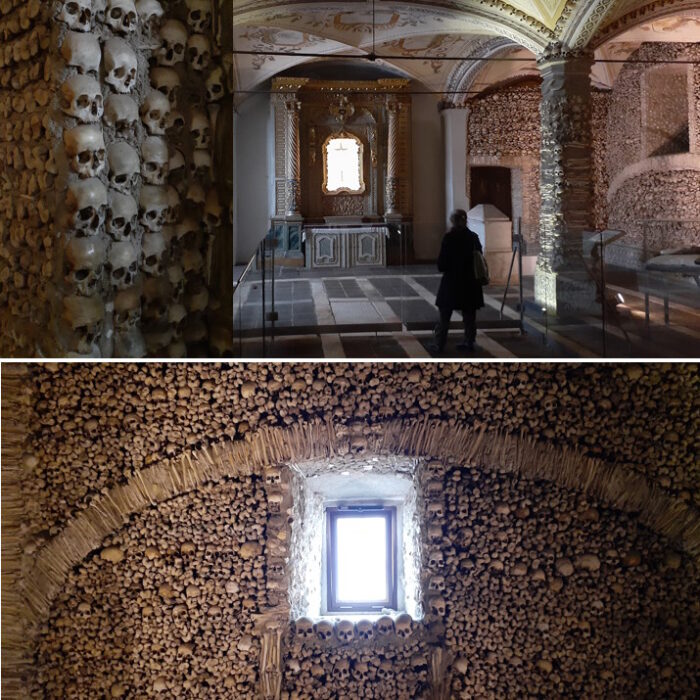Inscription at the entrance:
“Nós ossos que aqui estamos pelos vossos esperamos.”)
“We bones that are here, for your bones we wait.”
Step into the bone chapel in Evora, Portugal,
and the little mix-up you had at the hotel,
or the rain that’s ruined your beach day, or
the limp lettuce and skewer of overcooked squid —
is forgotten, terminou!
And when you leave, minutes, or, seemingly, days later,
you vow to send your family and friends personalized postcards,
telling them, “I’ll never forget the height of the sun on the door
the hour you were born.” Or, “What a delicious, brazen wonder,
to be living on this earth, at the same moment as you.” Or,
“Watching you weed the garden was part of my destination.”
Like a perpetual Ash Wednesday, like a near-death experience,
just the shock of it, like a cudgel, like a shout, wake up! O dreamer,
to your one and only life!
Yet, a moment later I’m snapping pictures.
The young couple beside me take smiling selfies, say, ghoulish!
say, like, sooooo eerie! then walk across the square
and down the alley to the pub — content with brochure info:
how the 16th-century cemeteries were overcrowded
so the Franciscan monks dug up 5000 bodies,
prepared mortar, became skilled layers of skulls,
femurs, fibulae, radii, humeri.
I won’t be back so I linger a bit longer, try, like the old monks,
to honour the souls these bones once bore; try, but fail,
to feel that singular silence that travels in us,
and travels with us after we are gone.
The world is a hard place and our bones are hard enough
to endure for many years. Likewise, our skulls — their architecture,
not unlike the domes of cathedrals; how they hold the instruments
of praises and curses, how they house the passageways
of wonder and delight, sorrow and heartache.
How in the midst of this trip, our friend and travelling companion,
hears of the death of his mother.
How a friend back home is facing his cancer.
How every one of us has drunk the grief of intimate loss,
and will drink more.
We are, of course, all dying, all flowing forward,
swept up, getting snagged, yet flowing, all members
of this brilliant kaleidoscope of beauty and mystery.
And now it’s spring, the reckless season, the ribald season
of resurrection, where, right out my window the earth
is enrobing — slipping into its great florid garment.
All of which makes one wonder,
as we live and breathe and move about,
in these, our temporary bone temples,
why, we can’t be sufficiently kinder.


I am loving living (and dying) a little vicariously through your posts through Portugal.
Thank you, Tiffany. That makes me happy.
This chapel is surely something to ponder. Thank you for sharing it with us, both in pictures but especially in your words that weave the ‘what was’ and ‘what will be.’ They make me wonder “Would I be changed?” were I to witness the same scene. (Not sure of the punctuation of that sentence!) Why can’t we be sufficiently kinder, indeed.
Thank you so much, Ann.
Wonderful.
Thank you, Emily.
“What a delicious, brazen wonder,
to be living on this earth, at the same moment as you.”
Thank you, Ike. Back at you.
Thank-you again, Stephen for your thoughtful words. I always read your poems at least twice. The second reading of this one got me. I missed so much on the first time through. I love your postcard messages and your typical juxtaposition of the inner with the outer, the practical with the divine. I toast you with a small glass of Portuguese wine.
Thank you, Kirk, for your lovely, encouraging response. I toast you back!
Your words always, somehow do make me just a little kinder, just a little more aware. Thank you once again!
Thank you, Marcia, this means a lot to me.
This is so beautiful, Stephen. Thank youso much.
Tina, thank you for your kind words.
Thanks for this description of one place on our diverse, beyond knowing globe and the reflection into our human and spiritual experience
Paul, I thoroughly appreciate your knowing response. Thank you.
So moving, so eloquent so right on, Stephen. Would love to see/hear you st PEP someday!
Thank you so much for this, Nancy. I wish I lived closer to Victoria, I miss hearing you read your wonderful work as well.
“Sufficiently kinder” – praying it may be so. Reflections like this help – thanks, Steve.
And thank you, Sam.
This took me right back to my own “bone chapel” experience in Rome. I wandered in having no idea what I was about to see. I had followed a little lineup outside thinking surely that meant something was worth seeing. I paid a couple of coins and walked in and wondered at the beauty of each manicured room. I had no idea what I was seeing until I read the signs. “No photographs. No food or drink. Do not touch the bones.” My eyes opened a second time and I truly saw what I’d been looking at the whole time. Angels made from the bones of children. Sconces formed from hip bones. Finger-chandeliers. Entire mummified monk corpses lining one wall towards the bone altar. I don’t remember this place often but I can see so much of it now. Thanks for brining me back to somewhere sacred – as you so often do – with your words.
Wonderful. Thank you, Dave, for sharing your own experience. That “bone chapel” sounds at least as arresting. And thanks for your encouragement.